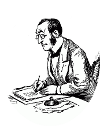Tom Altherr Contemplates His Favorite Finds
"I did exclaim several choice phrases"
Property "Version" (as page type) with input value "{{{Version}}}" contains invalid characters or is incomplete and therefore can cause unexpected results during a query or annotation process.
Note: Coloradan Tom Altherr is our prizewinning dean of digging, and has unearthed well over 150 new references to early ballplaying in the United States, many of them collected in his prize-winning 2000 essay, Leavel Enough to Play Ball, now available online at: http://protoball.org/A_Place_Leavel_Enough_to_Play_Ball. We asked him to tell us about some of his most satisfying finds.
---
“As I recall, I did exclaim several choice phrases when I first saw Lt. Henry Dearborn's two 1779 diary entries about finding a place "leavel" enough to play ball. That, for me, was an eye-opener. But very quickly similar Revolutionary War and War of 1812 sources, college, academy, and municipal regulations, children's books, and all sorts of autobiographical reminiscences came flooding in, attesting to a widespread existence of early baseball-type games. The joy, if that is the right word, has been in trying to sort them all out. And the whole process of research proved more complex than expected. Sources that would seem automatically ripe for references turned out to have none, but some dull-as-dishwater diary would all of a sudden include a nugget. Moreover, much of what I have researched have been documents, books, sources accessible for years, But whereas other historians may have mined them for material on military, political, or economic history, I came looking for what others had dismissed or neglected.
Google, JSTOR, and other search engines have been of quite some help, but still many of my discoveries have resulted from chance and good old serendipity. This is why when a student seeking to emulate or build off my research asks where to start, I just smile and say, ‘Start digging.’"
Comments
<comments voting="Plus" />
